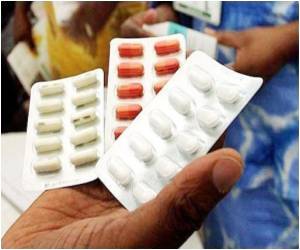- Anorgasmia or Coughlan's syndrome: A Complete Insight - (http://www.womenfitness.net/anorgasmia_coughlansyndrome.htm)
- Anorgasmia in women - (http://www.mayoclinic.org/diseases-conditions/anorgasmia/basics/definition/con-20033544)
What is Anorgasmia?
Anorgasmia or Coughlan's syndrome or frigidity is a type of sexual dysfunction in which a person fails to achieve an orgasm, even after ample sexual stimulation and excitement.
Anorgasmia is a common occurrence in females as compared to males. Orgasms vary in frequency and intensity, and the amount of stimulation needed to reach them is different in different individuals. Post-menopausal women usually face the problem of anorgasmia, which could eventually lead to sexual frustration. In males, anorgasmia is most closely associated with delayed ejaculation despite an ability to have a suitable erection.

Past research indicates that about 10 to 40% of adult American women face problems in achieving orgasms.
What are the Types of Anorgasmia?
Primary Anorgasmia
Primary anorgasmia, which is more commonly seen in women, is a condition where one has never experienced an orgasm. Women with this condition experience a relatively low level of sexual excitement causing frustration, restlessness and pelvic pain in some cases. Reasons for this disorder are unknown, even though women report to have a caring partner with adequate time and privacy for sex, and there is usually no known medical issues which could affect their sexual satisfaction.
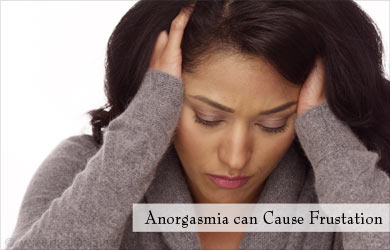
Secondary Anorgasmia
Secondary anorgasmia is the inability to have orgasms or to reach orgasms of such intensity as the ones experienced in the past. It could be attributed to various causes such as depression, alcoholism, surgery such as total hysterectomy, certain medications, estrogen deprivation associated with menopause, amongst many others.
Situational Anorgasmia
As the name indicates, in this type of anorgasmia, people who are orgasmic in some situations may not be in others. Many factors could lead to this such as emotional concerns, fatigue, feeling pressured to having sex, amongst others. It is possible for a person to have an orgasm from one type of stimulation but not from another, achieve orgasm with one partner but not another. The person tends to have an orgasm only under certain conditions or with a certain type or amount of foreplay only.
What are the Causes of Anorgasmia?
Anorgasmia is a complex combination of many factors, some of which are listed below:
- Medical conditions which affect the blood flow to the pelvic region such as diabetic neuropathy, complications from genital surgery, multiple sclerosis, Parkinson’s disease.
- Gynecological issues such as hysterectomy, pregnancy, cancer surgeries amongst others may affect orgasm.
- Sexual concerns or sexual phobia, such as uncomfortable or painful intercourse possibly due to some pelvic trauma, trauma during childbirth such as vaginal tearing, endometriosis, ovarian cyst, surgical scars, which could lead to obstruction in the vaginal area, possibly making intercourse a painful experience.
- Physical problems
Vaginismus is a spasm or strong involuntary contraction of the muscles surrounding the vagina, leading to tightening of the vaginal opening, which makes penetration quite painful. Any past, unwanted sexual experiences such as molestation or rape could possibly result in this condition.
Dyspareunia is an uncomfortable or painful sexual intercourse. Leading causes of this condition could be vaginal infections or reaction to contraceptive products, lubricants.
- Medications can sometimes cause situational anorgasmia. Medications that are particularly incriminated are selective serotonin reuptake inhibitors (SSRIs), some blood pressure medications, antihistamines, anticonvulsants, and barbiturates. Sexual dysfunction which results from prior use of the antidepressants SSRIs is known as post-SSRI sexual dysfunction (PSSD). Chemotherapy drugs, as well as radiation therapy used to treat certain cancers, have reportedly caused a decrease in vaginal lubrication as well as tenderness in membranes surrounding the genital area.
- Smoking and alcohol Smoking could lead to peripheral vascular disease, which could affect blood flow to the penis in males, and clitoris as well as the vaginal tissues in females. Drinking too much alcohol may diminish your ability to climax as alcohol could inhibit sexual response by depressing the central nervous system.
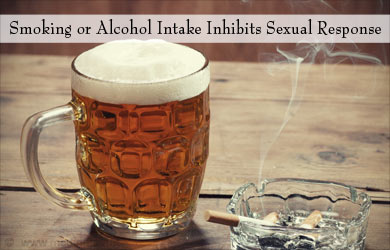
- Psychological causes such as stress, financial pressures, mental health problems, sexual abuse in the past can cause anorgasmia.
- Hormonal and anatomical changes particularly affect older women due to normal aging process. In many women, low levels of estrogen during menopause could trigger decreased blood flow to the vagina or clitoris, leading to vaginal dryness and affecting arousal.
- Relationship issues such as lack of trust in partner due to infidelity, arguments or fights, poor communication of sexual needs could also affect orgasms.
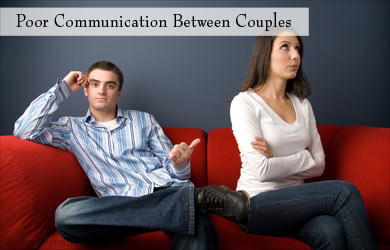
How Do You Diagnose Anorgasmia?
Diagnosis of anorgasmia is subjective and depends a great deal on the thoughts, emotions and feelings of the person experiencing it.
Physical Examination: A general physical examination would be conducted to evaluate any possible physical causes or underlying medical conditions. The doctor may check your pelvic and genital area to overrule any anatomical or physical reasons for anorgasmia.
Laboratory Tests: Blood tests are performed to check for co-existing medical conditions such as diabetes, folate and vitamin B-12 deficiency, amongst others. Full blood count, liver function tests, hormonal tests like total testosterone levels, estradiol levels, thyroid function tests, follicle stimulating hormone (FSH) levels, and sex hormone-binding globulin (SHBG) levels, fasting blood sugar levels, lipid profile, amongst many others, are evaluated. Calcium levels are also tested to check for any abnormalities in electrolyte levels.
Mental Status Examination: If you are found to be suffering from primary anorgasmia, then your doctor may ask questions to evaluate the relationship between sexual problems and mood changes. History of any acute and chronic medical illness such as depression and anxiety would be obtained.
Sexual History: Your doctor will ask you questions about your past and present sexual as well as surgical history in order to find out the details and devise an effective treatment for you. You need to inform your doctor if you have been taking any medications for anorgasmia or have been taking any illicit drugs. Details of your sexual activity, frequency, number of partners would also be evaluated.
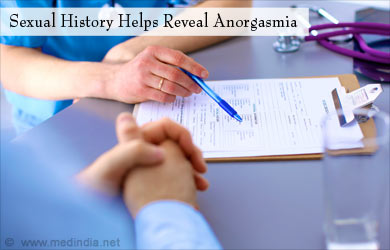
How Do You Treat Anorgasmia?
Therapeutic Sex Techniques: These involve various kinds of behavioral exercises which you and your partner could try at home. One of them is a caressing or body-touching exercise known as “sensate focus” which not only increases body awareness, but also teaches you how to arouse your partner by touching and feeling their body in a specific way without actually focusing on orgasm as an end-point. Directed masturbation, use of vibrators and clitoral stimulation techniques are different ways of pleasurable explorations of your body. You could use these techniques with your partner during intercourse to maximize the chances of orgasm.
Counseling for Couples: Counseling would deal with emotional or situational factors of the couple, the most likely causes of lack of orgasm. Both partners are advised to attend the counseling sessions, which usually begins with sexual education such as how the sexual response cycle varies in men and women and different ways of sexual arousal in women. The counselors will also help the couple to deal with any conflicts or arguments in their relationship.

Understanding Your Own Anatomy: If you suffer from anorgasmia, take some time out and try to understand and explore your body. The problem may be inadequate sexual stimulation, so you could try and use self-stimulators or vibrators to see what kind of touch excites you and share this information with your partner. This can lead to better sexual satisfaction.
Cognitive Behavioral Therapy (CBT): CBT is a form of psychotherapy that could help take care of your problems by changing the way you think and behave and change any kinds of negative thoughts, any inhibitions or fear about sex. It focuses on increasing positive sexual experiences.
Effective Sexual Stimulation: Not getting adequate sexual stimulation could be the underlying problem faced by many women in reaching orgasm. Couples are encouraged to try and switch positions during sex to generate effective clitoral stimulation. Coital Alignment Technique (CAT) is a type of mutual rocking sexual position to maximize the contact of the penile shaft with the clitoris in an attempt to improve ability of the male-superior coitus to result in female orgasm. Caressing other parts of your body such as breasts, nipple, periurethral glands may also trigger an orgasm.
Drugs Used for Anorgasmia
Estrogen therapy: This therapy is used mainly for post-menopausal women. Taking a pill, patch or gel form of estrogen (systemic estrogen therapy) may have a positive outcome on mood and affect sexual response. You could also try local estrogen therapy to improve blood flow to the vaginal area such as a vaginal estrogen ring or slow-releasing estrogen vaginal suppository. In certain cases, a combination of estrogen and progesterone is used.
Testosterone therapy: Even though testosterone is predominantly a male hormone, it also plays a vital role in female sexual functionality. Few studies have shown that it might increase sexual arousal in women, however its use in sexual dysfunction in women has not been approved by FDA yet. Moreover, it could also lead to some unwanted side effects in women like the development of excess body hair (hirsutism) and male-pattern baldness.
Natural therapies: Some herbal compounds such as Ma Huang (Chinese herb) amongst others may help treat anorgasmia, but you need to consult your physician before using them. Certain massage oils such as Zestra® and a nutritional supplement containing L-arginine (ArginMax®) could also help you, but should be used strictly under medical supervision.
Health Tips
- If you suffer from anorgasmia, remember you are not alone and don’t be shy to seek medical help immediately if there are any difficulties that you are facing during your sexual episodes.
- Your sexual life is linked to your overall mental, physical, and emotional health, so try to reduce everyday stressors which may be contributing to your inability to reaching an orgasm.
- Try various relaxation techniques such as yoga, breathing and do something soothing along with your partner before getting intimate.
- Keep the genital area clean at all times to minimize any chances of vaginal or yeast infections.
- Maintain a healthy lifestyle and focus on maintaining emotional and physical intimacy with your partner.

- Try and limit overindulging in fatty foods which not only leads to high blood cholesterol and obesity, but also to lethargy, and a poor body image.
- If you are a chain smoker and need help quitting, try nicotine gum or patches or ask your doctor about drugs like bupropion.
- Last but not the least, be sensual, playful and use creative techniques to bring back the fun in sex. Never give up if things are not working out for you; remember your sex therapist can guide and treat you to be able to have a fulfilling sex life.



